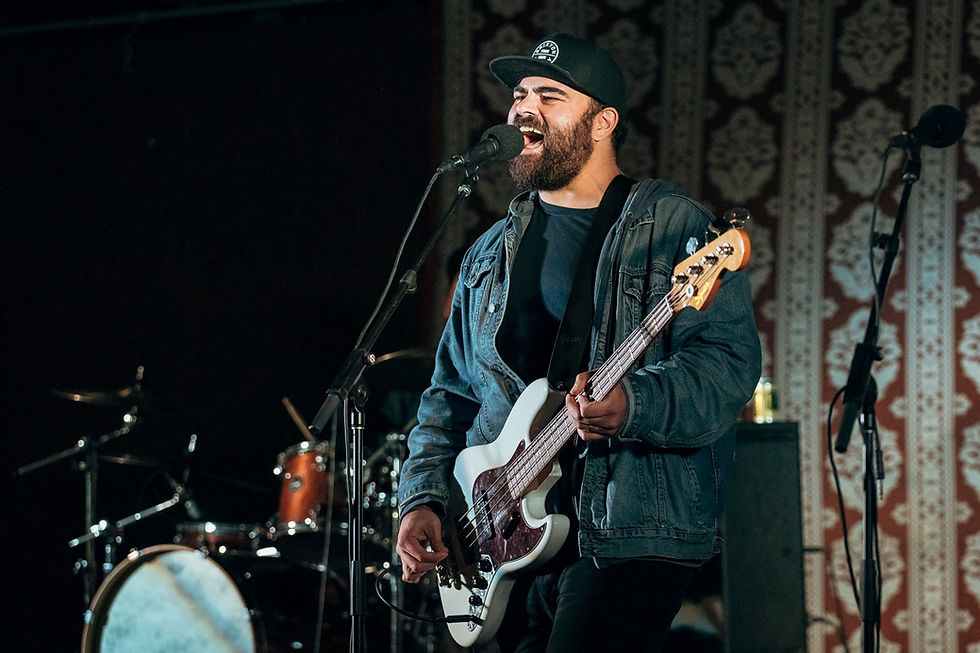Dillon Currie’s Vines of Time- In His Own Words
- William Yannacoulias

- Oct 5, 2023
- 6 min read
By Will Yannacoulias

Dillon Currie has made a name for himself over the last decade as the charismatic, swaggering frontman of the high-energy hard rock party band League Of Wolves. Distanced at the beginning of the pandemic from his bandmates and the intensity of the stage, Currie slowed down for the first time in years, savouring a more measured pace and exploring an introspective, contemplative approach to songwriting. The result isVines of Time, a beautiful, ambitious and intensely personal work by an artist seemingly just-returned from a journey of self-discovery and eager to share the experience.
Citing influences such as Leonard Cohen, The Beatles, Elliot Smith, Andy Shauf and Band of Horses, Currie relished the layers of nuance afforded to him in writing and releasing an album like Vines of Time. The record is an old fashioned concept album, the theme of time, growth, and sometimes uncomfortable realization woven throughout. Along with a central theme, the songs are also grouped into an A side of idyllic nostalgic romantic ideals, and a B side of stark realities, where the thinly veiled harshness of life is brought to the forefront. Currie further paired many of the songs directly as yin-yang opposite perspectives of the same topic. With so much thought, structure and meaning put into the release I felt it would be satisfying to join Currie in a track-by-track songwriter's reflection of his songs. Please enjoy Dillon Currie's Vines of Time- in his own words.

SIDE A:
In My Town
"I was imagining the world how it was when I was a kid, growing up in a small town in an isolated environment. Thinking about how simple life was, and within the context of the album, reflecting on preconceived ideas of home and realizing those are mystical in nature and not really true. Am I living in a dream?"
Mary Anne (By My Side)
"When I started these songs one of the things I set out to do was write in a more narrative, fictional style, and that name just came to me. She’s not based on anyone in particular but rather is an embodiment of a lot of people in my life.
Mary Anne (By My Side) was one of the first things I wrote for the record. The idea behind it is a relationship where it doesn’t matter if you’re right or wrong, as long as you’re with the person you love."
Higher Than The Clouds
"This one was inspired by Humpty Dumpty, believe it or not. I wanted it to feel like an old standard, a simple rise and fall story, like a nursery rhyme with a moral- be careful what you wish for. Also, I’ve always loved songs where the chorus at the start of the song means something complete different when you sing it again at the end of the song."
Old Keys
"That one is probably the most personal song on the album. I was looking one day at my keychain and realized I had keys to all these things I don’t have anymore; our old band house we rented, an old truck I crashed. Half these keys I don’t even know what they’re for, but I can’t throw them away. I wrote that song very quickly, it’s three tales of near death experiences that I don’t even think about until I see those keys.
The last verse details an experience I had last summer. A friend that I grew up with passed away; he actually took me to see Leonard Cohen, my first concert, and I sang ‘Hallelujah’ at his funeral. When I was going to get the lyrics from the car I heard a voice right in my ear, and it really scared me. That was a different kind of near death experience, standing there dumbfounded with my keys in my hand."
White Lies
"We all know someone we grew up with who we let get away with a little too much, and your relationship becomes a bit of a ‘boys will be boys’ thing, and this song is about challenging that. It’s about accountability- between accountability on them and accountability on you. Being a parent causes you to reflect on your youth and that’s a big part of this song and really the whole record- exploring my values and challenging myself."

SIDE B
In The Wild
"As the first song on Side B, 'In The Wild' would be the opposite song of 'In My Town'. I think this is the most important song on the record. I grew up in what felt like a perfect little place, and so these kids who lived through residential school is just unfathomable to me. When news reached me of the mass graves at the residential schools in the last few years I couldn't stop thinking about it, I was so upset and I needed to write that song. I didn't want to speak for anyone else so I wrote it from a settler's perspective, but saying it plainly what happened. I've never done so much work on a song, it was too important to write it in a day, that song took me over a year to write."
Mary Anne (I’m Sorry)
"This is the other side of the coin- the first Mary Anne song is an old fashioned love song and this is the other side of that, the harsher realities of when things go wrong. I wanted to write a tragedy- it’s not a poor me song, but asking ‘what do I do when it’s too late?’ The first side of the record is structured to be more youthful and the later songs are over that hill."
Living in Hell
"This song is about that creative struggle, that whole tortured artist thing. As a kid we always want to be famous, everyone wants to be remembered. It’s about legacy and mortality, having goals and not reaching them. the grind of trying to climb a mountain and never getting there, going nowhere. Another take on the fact that things aren’t always roses. Writing during the pandemic, legacy and mortality was definitely on my mind a lot. Sometimes you have to write songs for yourself; it's therapeutic, writing the things you sometimes can't say."
Ghost in the Wind
"This song was inspired by visiting Toronto for the first time ten years ago and seeing homelessness on that scale for the first time. I can remember not being able to look people in the eyes, as a kid from small town Saskatchewan just not knowing what to do with that. There's a shame that came with that and I wanted to revisit it. I wanted to make sure this wasn’t a pity thing, but to try to connect and see things from their perspective. The other thing I took from that trip to Toronto so many years ago was that feeling of being little and insignificant, like a little bug. That song was co-written with TOVA, a Toronto-Regina R&B/Hip Hop artist. We had teamed up at a songwriting camp, it was the Canadian Songwriting Challenge that SaskMusic was putting on. I don't venture too far outside of rock music so it was really cool to be paired up with him, we were both on the fringes style wise, opposite fringes, and I think that's why they paired us up."
Vines of Time
"'Vines of Time' wraps it up for me. The song lands on a semblance of hope despite the hard road travelled throughout the album. A reflection of life, I imagine the narrator from "In My Town" grown up, looking back and sharing the wisdom to the next person in their life. Things are not going to always go as planned and that's ok. Vines of Time can be the things in your past that hold you back, and you break free of them and move on."
As we concluded our conversation I asked Currie about why he felt compelled to write such a personal collection of songs, what inspired and motivated him to explore himself and share so candidly. "When I started writing this record" he shared, " I was really contemplating my past and looking at myself and trying to be straight up about the mistakes I've made and the things I'm maybe not so proud of. Looking at life through an unfiltered lens, an honest take on the ups and downs and the notion that it doesn't all have to be perfect. I wanted to explore forgiveness, redemption, loss, happiness and all of those things that make life what it is. That was the goal I set for myself, to be honest and introspective."
Vines Of Time is available on vinyl, compact disc and all streaming services. Join Dillon Currie this Saturday in Saskatoon at the Capitol Music Club for the Vines Of Time album release party with friends Marissa Burwell and Keiffer Mclean



Comments